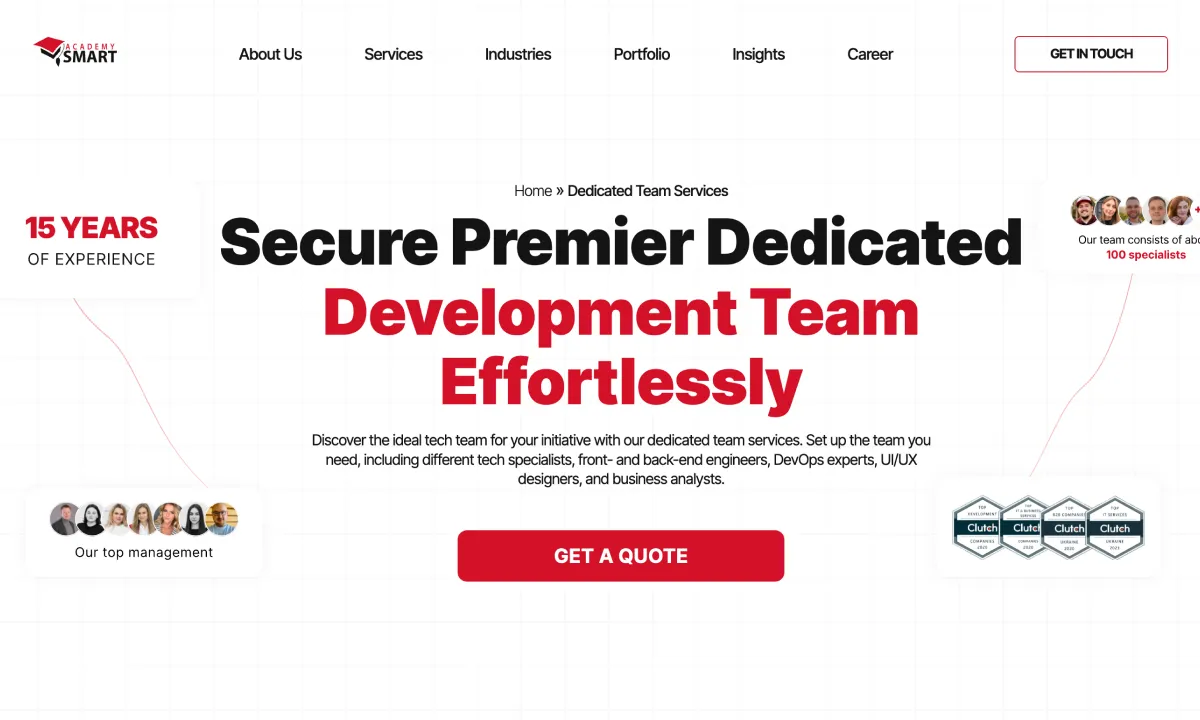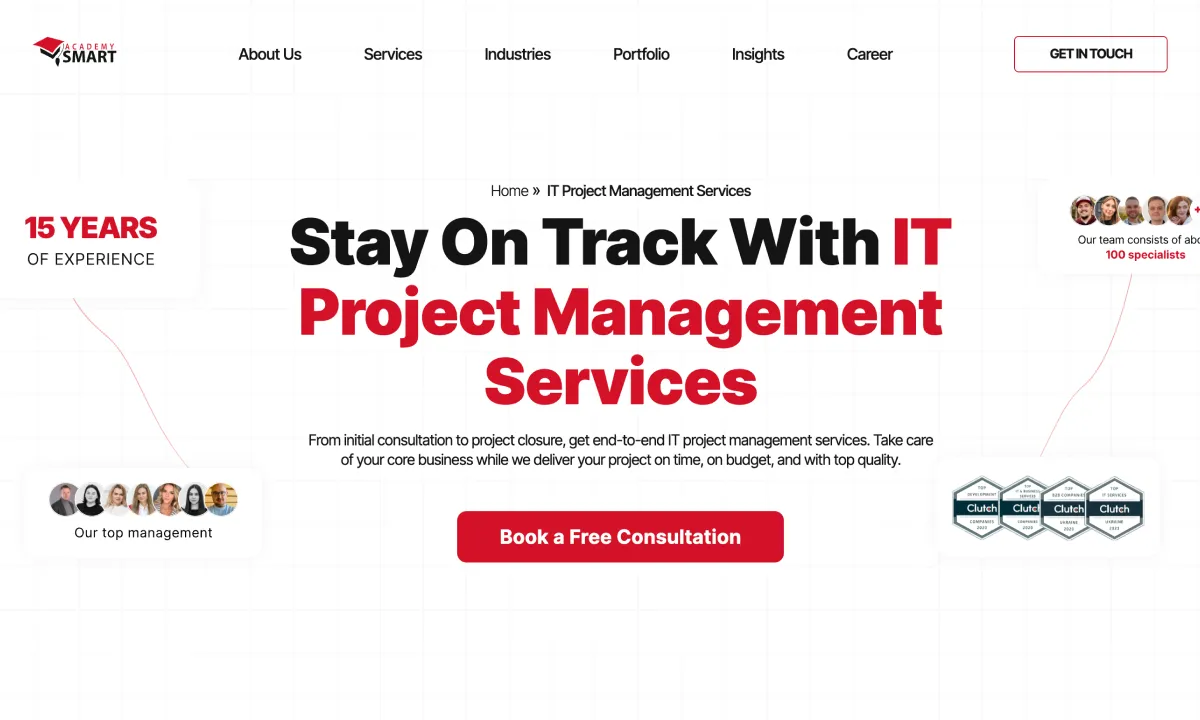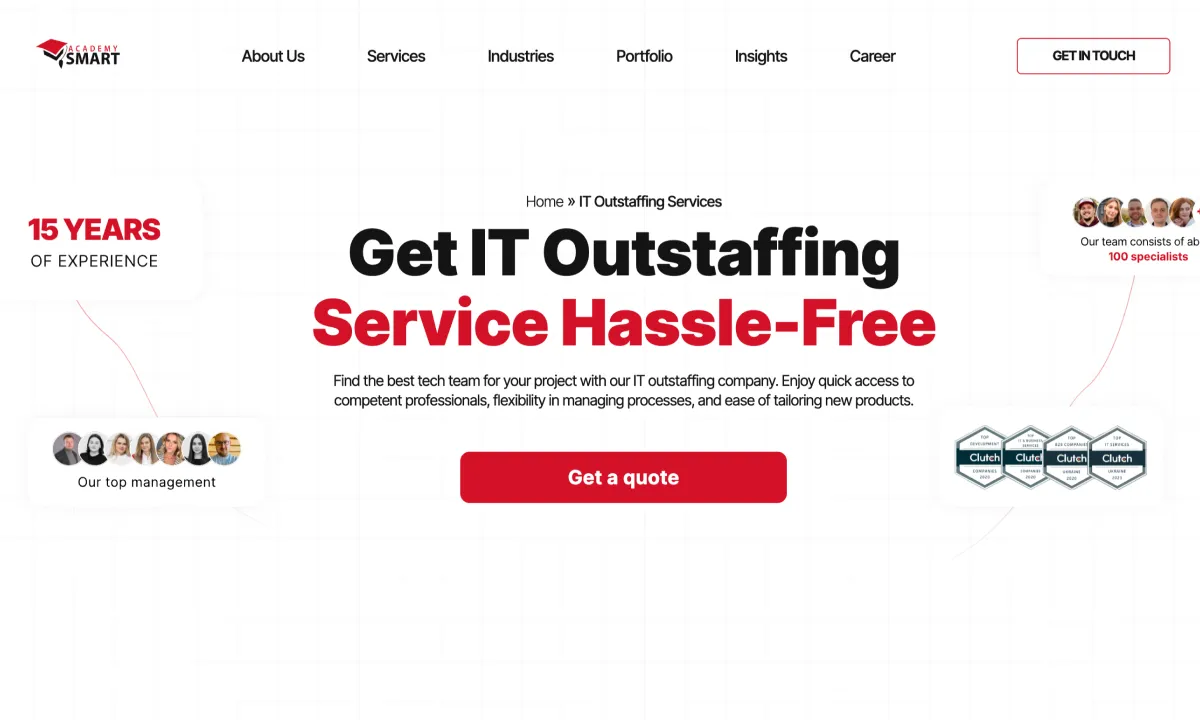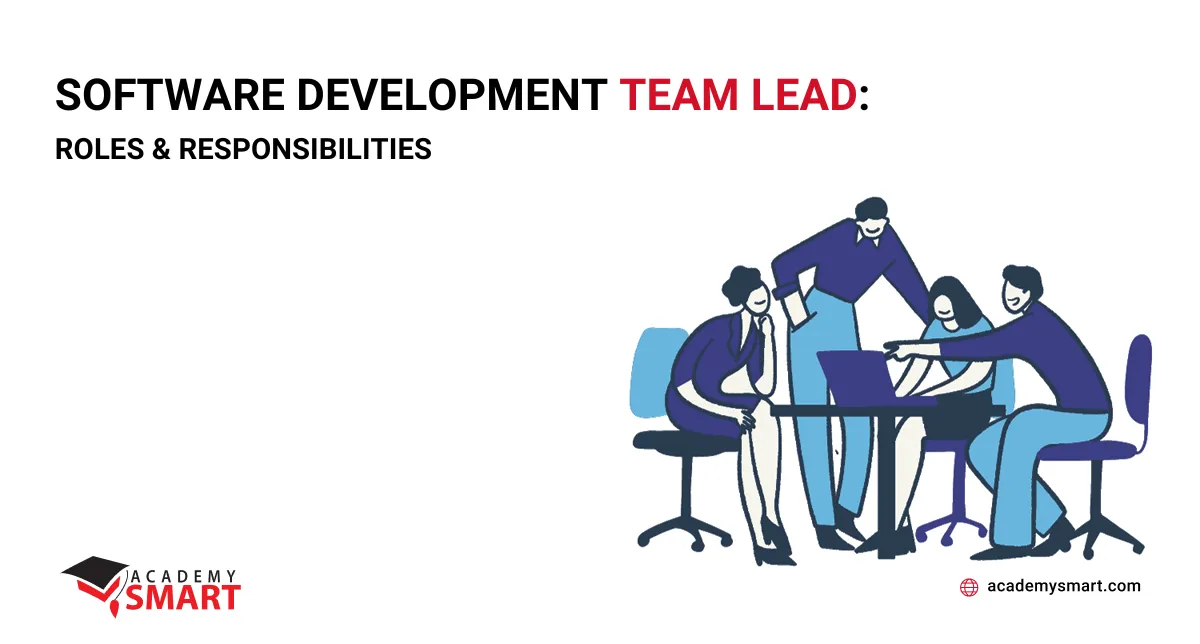
How to hire QA Engineers for Your Project
Contents
Development of a software product is a complex and time-consuming process. Striving to create code that works great and stays on budget can become a real challenge since there is a need to ensure the highest standard of product quality. This article will tell you about IT specialists in the area of Quality Assurance, the benefits they can bring to your project, and how to hire QA engineers to equip your staff quickly.
Who is a QA Engineer
QA engineers, or Quality Assurance engineers, ensure the quality and reliability of software applications through rigorous testing and validation processes. They play a vital role in identifying and preventing defects, providing a seamless user experience. The QA engineers work closely with the developers and other project stakeholders to improve the quality of the product, discuss changes, and ensure that the software application runs smoothly.
The daily work responsibilities of such experts include the following:
- QA engineers develop detailed test plans and scenarios based on the functional and technical requirements of the product. These documents indicate the aspects of the development to check.
- They execute tests, verifying that the application works according to the given scenarios. That includes checking functionality, compatibility, performance, security, and other essential aspects.
- When QA Engineers find defects or bugs in a product, they document them in detail, including how to reproduce the issues, and pass this information on to the developers for correction.
- They can also develop supporting automated test scripts and frameworks to speed up the testing process and make it more efficient.
- In the later stages of development, the QA engineers are involved in the product’s release and can monitor its performance in real-time.
Below, you may watch a video presenting our company’s completed projects to see some examples of QA engineers’ participation in software application development. Without these specialists in the team, it would be impossible to create successful projects that are user-friendly, profitable, productive.
Types of QA Engineers
Different QA testers specialize in various aspects of quality assurance in software development. If your team asks to hire QA engineers, it’s essential to understand the range of expertise your project needs. Here are some key types based on the primary professional skills you may be looking for.
Manual QA Engineer
These employees manually test software applications by executing test cases, documenting defects, and ensuring the software meets specified quality standards. They often have strong attention to detail and perform exploratory testing to find issues that automated tests might miss.
Automation QA Engineer
Such testers focus on creating test scripts using automation testing tools and frameworks. They work to improve testing efficiency and coverage by automating repetitive and regression tests. Scripting languages like Python, JavaScript, or Java are commonly used in automation routines. For instance, solid JavaScript skills are crucial for web application testing because JS often interacts with web page elements. Here’s a guide on how to hire the right JavaScript programmer to make this task easier.
Performance QA Engineer
These QA engineers specialize in evaluating the performance and scalability of software applications. They conduct load testing, stress testing, and performance profiling to identify bottlenecks and ensure the software can handle expected loads.
Security QA Engineer
Security specialists are responsible for identifying and mitigating security vulnerabilities in software. They perform security testing, code reviews, and threat modeling to ensure the software complies with security standards and best practices.
Usability QA Engineer
Usability testers evaluate software applications’ user interface (UI) and user experience (UX). They conduct usability testing, accessibility testing, and user acceptance testing to be sure the software is user-friendly and meets design requirements.
Database QA Engineer
QA engineers specializing in testing database systems, data integrity, and data migration processes ensure data is stored, retrieved, and manipulated correctly within the application.
Mobile QA Engineer
These IT experts specialize in testing mobile applications on various devices and platforms, including iOS and Android. They ensure mobile apps function correctly, are responsive, and adhere to platform-specific guidelines.
CI/CD QA Engineer
Such engineers automate the testing and deployment pipelines to enable rapid and reliable software delivery. They use CI/CD tools and practices to maintain high-quality software releases.
Localization QA Engineer
These specialists ensure that software is compatible with multiple languages, regions, and cultural contexts. They test for language translation, date and time formats, and other localization-related aspects.
These are just some typical of the many specialized possible tasks within the field of QA engineering. Depending on the complexity of the software project and the organization’s priorities, various QA engineers may work together to ensure the overall quality of the software product.
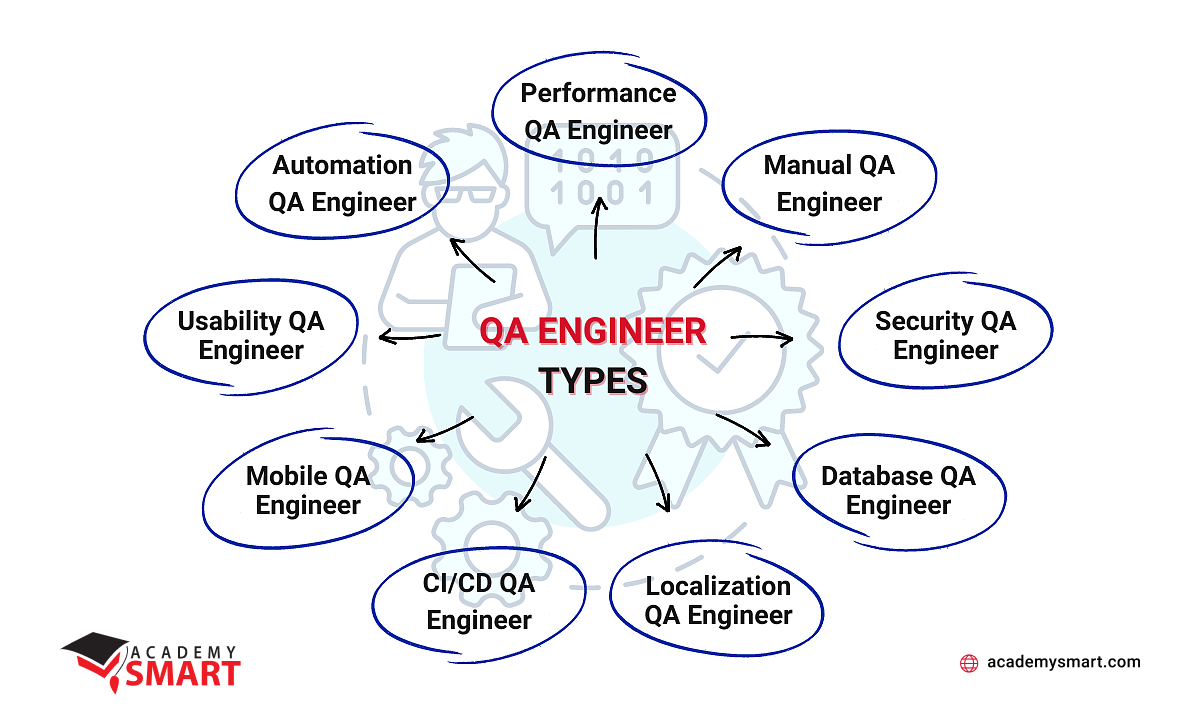
QA engineer types
Benefits of hiring QA Engineers
QA engineers provide reliability, eliminate defects, and minimize risks, reducing future fixes’ costs. Effective quality management helps to meet deadlines and budgets, contributing to project success and customer satisfaction. That is what lies on the surface. Let’s further explore why hiring QA engineers for your staff can make it easier for you to achieve your business goals.
Improved software quality
QA engineers’ work ensures that your software undergoes complex testing, leading to fewer bugs and defects in the final product. It results in higher-quality software that is more reliable and user-friendly.
Early problem identification
QA tests help to identify problems early in development, which reduces the cost of fixing them and increases the entire team’s efficiency.
Cost savings
Careful bugs and vulnerability detection at all stages of the development process reduce the cost of fixing critical defects post-release, as addressing them during app creation is generally less expensive.
Enhanced user experience
User-centric testing ensures that the app meets customer expectations. That leads to advanced user satisfaction, positive reviews, and increased user retention.
Faster time to market
When issues are identified and addressed promptly, it accelerates the software release cycle, allowing your product to reach the market sooner.
Compliance and security
Security and compliance quality assurance checks provide your software adherence to industry standards and regulations, reducing the risk of legal issues and security breaches.
Continuous improvement
QA engineering contributes to process improvement by providing valuable feedback on development practices. It helps your organization refine its workflows and deliver better products over time.
Risk mitigation
Systematic software testing helps identify and mitigate project risks. This proactive approach reduces the likelihood of project failures and costly edits.
Stakeholder confidence
The presence of QA engineers in the development team reinforces stakeholders’ confidence, including investors, clients, and end-users. It demonstrates your commitment and ability to deliver a high-quality product.
Competitive advantage
Well-tested software stands out in the market. It attracts more users and helps your organization outperform competitors by offering a superior user experience.
In summary, when you hire QA engineers, you gain experience and professional knowledge that can significantly increase the chances of success of your application in the market and a profitable return on investment in the future.
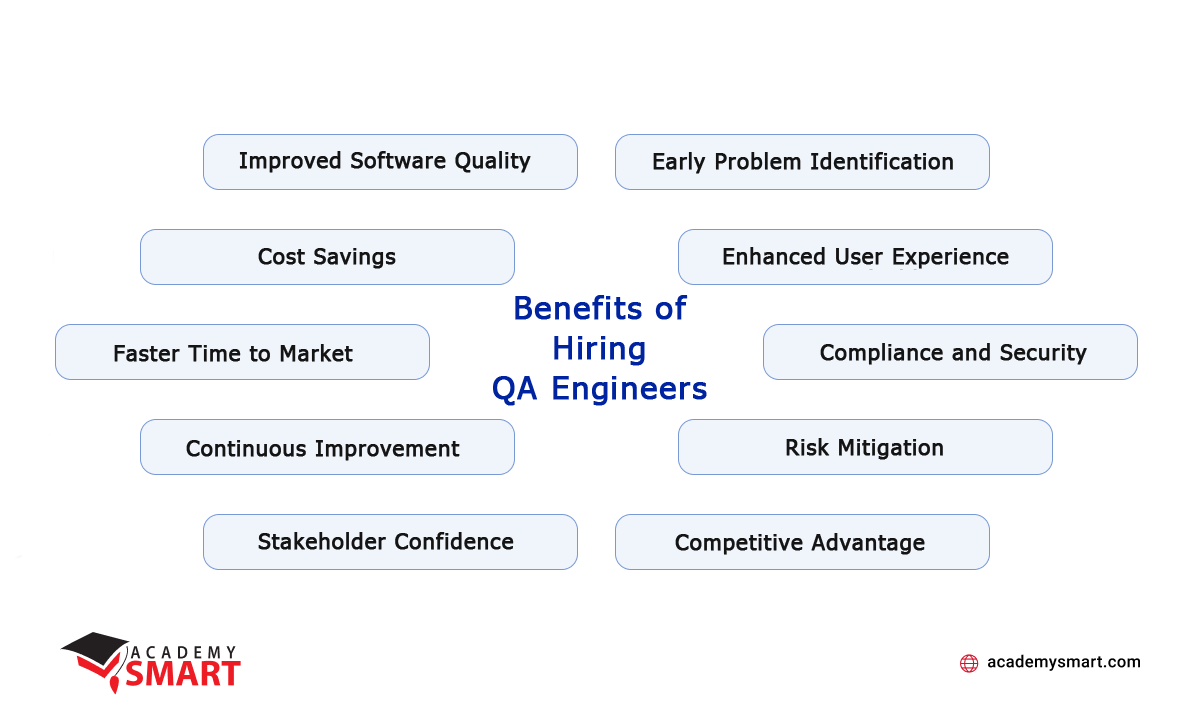
Why to hire QA engineers
Why is hiring QA Engineers important
Undoubtedly, the quality of a product or service is the foundation of a company’s reputation. Therefore, the basis of a customer-oriented approach is to ensure adequate quality as one of the most important strategic business goals, equal in importance to revenue generation.
Indeed, poor product quality can negatively affect the company’s perception and lead to the loss of customers. Practice mercilessly shows that post-release issues fixing is an expensive and nervous experience. That’s why your project requires responsible employees who can provide quality assurance and verification at all stages of the development cycle or at least at the most critical points. They should conduct rigorous product testing for errors, defects, and nonconformities to functional specifications to save time and resources that may be utilized in achieving other business purposes. Moreover, due to the work of QA engineers, the development process becomes more efficient itself and accelerates, which allows the product to reach your audience faster.
Paradoxically, the excellent work of testers is practically not noticeable, but its absence is very clearly visible. If something in an application doesn’t work as it should or is just plain awkward, it’s an obvious flaw in the quality team’s efforts. Your audience feels this and reacts quickly by choosing in favor of competitors. Unsurprisingly, professional development teams like Academy Smart usually include strong QA engineers by default. That is the only way to guarantee that the software created will be technically perfect and scalable in further development. Such apps examples you may see on our portfolio page.
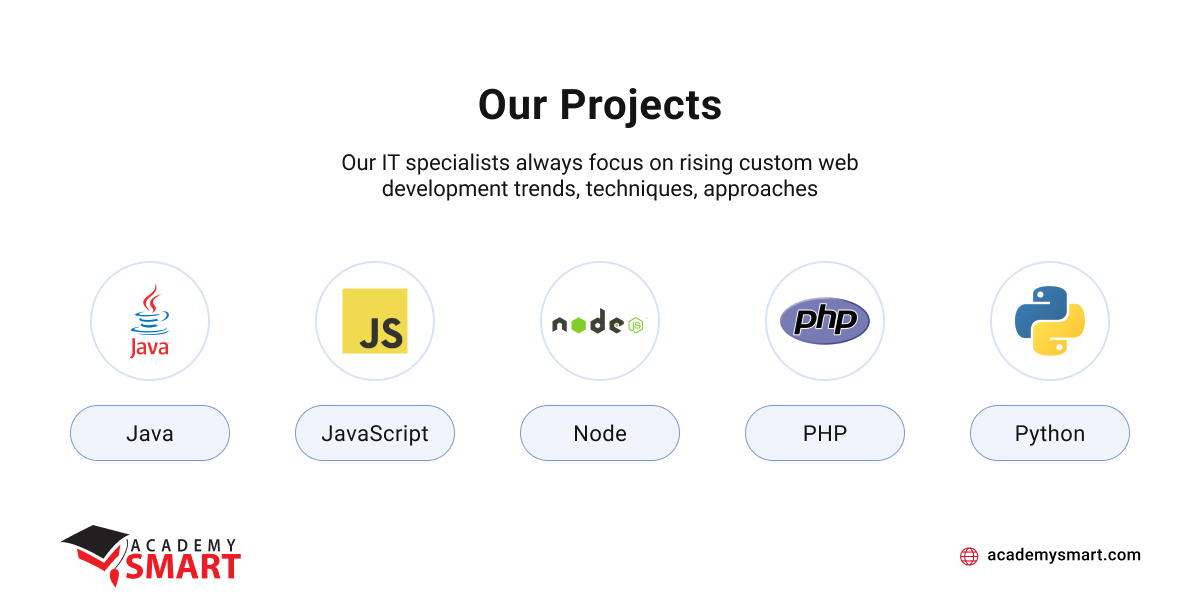
The software we made
How to hire QA Engineers
The personnel search process is always directly related to the job tasks that future employees must perform, and the Quality Assurance area is unlikely to be an exception here. Understanding your project’s needs for specific specialists and searching for talents in the most favorable places is essential.
Step 1. Define your requirements
Before you start the hiring process, clearly defining your requirements is crucial. Determine the specific skills, experience, and qualifications you need in QA engineers. You should also decide on an acceptable form of cooperation – in-house employee, freelancer, outstaffing or outsourcing. This initial step will serve as a roadmap for your recruitment efforts.
Step 2. Craft an attractive job description
Write a job description that outlines the technical skills required and highlights the company culture and values. A well-crafted job description can attract candidates who align with your organization’s mission.
Step 3. Review portfolios and resumes
Carefully review the portfolios and resumes of potential candidates. Look for relevant experience, projects, and certifications to meet and hire QA engineers who are suitable.
Step 4. Conduct technical interviews
Screen candidates through technical interviews to assess their problem-solving skills and practical knowledge. Ask scenario-based questions to gauge their ability to identify and address quality issues.
Step 5. Evaluate soft skills
Pay attention to the importance of soft skills. QA engineers need strong communication, teamwork, and attention to detail. Assess these qualities during personal interviews and reference checks.
Step 6. Onboard and train
Once you’ve made your selection, ensure a smooth onboarding process. Provide training and resources to help new QA engineers integrate seamlessly into your team and understand your product and processes.
In conclusion, hiring QA engineers is critical in ensuring your software applications’ quality and future growth. By following these steps and building a well-structured recruiting process, you may find the right QA talent to enhance your team and drive your projects to success.
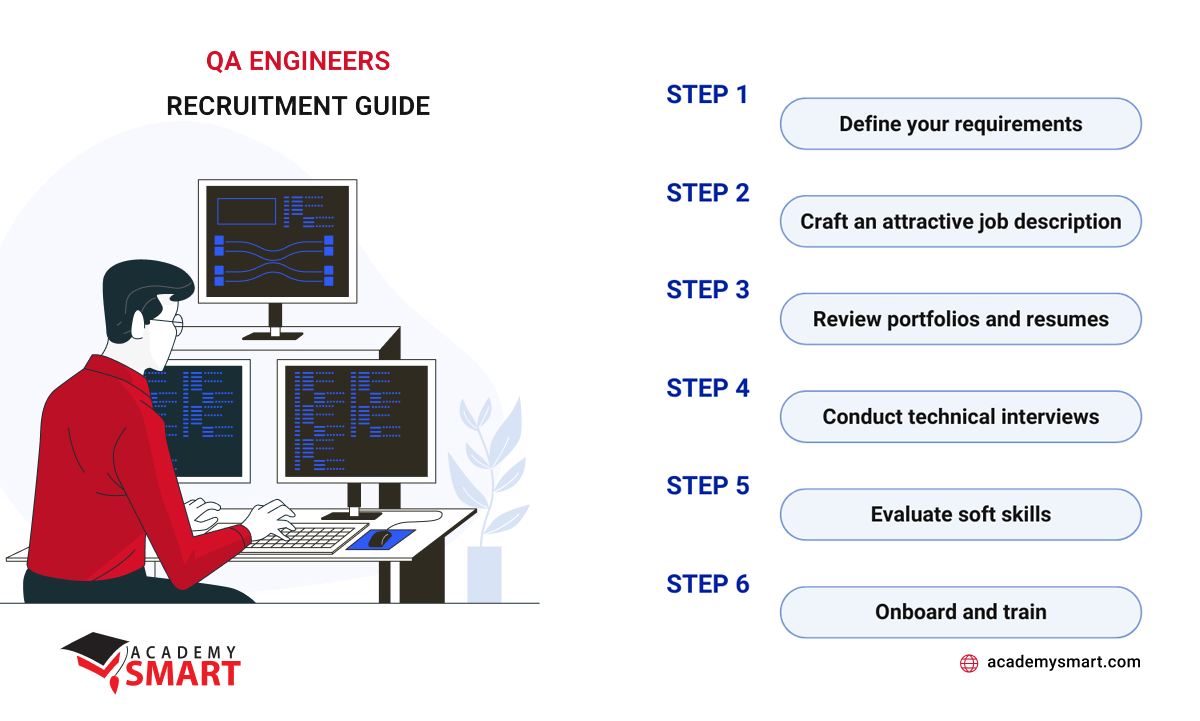
QA engineers recruitment guide
How Academy SMART can help you if you want to hire QA Engineers
Development company Academy Smart provides access to high-level experts with a wealth of QA experience. Our professionals know how to achieve the best software quality and make your product reliable since we have been developing complex enterprise applications for over the last 13 years.
We offer flexible staff augmentation models that allow you to hire QA engineers in a fast and cost-effective way or to order turnkey full-stack app development. Get in touch to share your specifications.
Hire QA Engineers: Frequently Asked Questions
What is the difference between QA Engineer and QA Tester?
A QA tester focuses on performing tests and identifying defects in a software product, while a QA engineer ensures the quality of a software product, including testing routines and test automation, and works on developing processes to improve quality.
Is test analyst and QA Engineer the same?
The test analyst is usually responsible for planning and organizing the testing process, developing test cases, and analyzing test results. The quality control engineer, on the other hand, covers the field of quality assurance in development more broadly, including testing and managing quality in all aspects of the project.
Book a free consultation

Reach out to start talking today!

